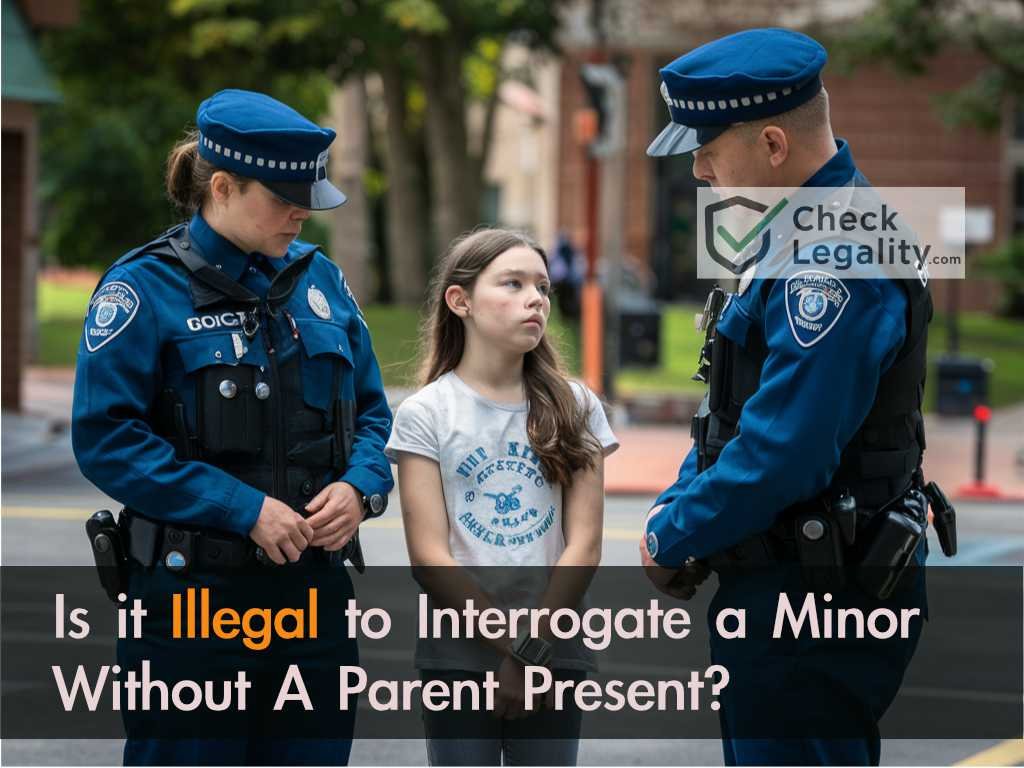Having your child questioned by law enforcement can be stressful, especially when it feels Illegal to Interrogate a Minor Without a Parent Present. Such moments can be intense yet confusing; however, understanding your rights and your child’s rights is crucial during such encounters. One of the parents’ most common questions is: Is it illegal to interrogate a minor without a parent present?
The answer, unfortunately, isn’t a simple yes or no, as many rules and laws in the legislation. There’s no overarching federal law dictating parental presence during a minor’s questioning. However, state and local laws can vary significantly, creating a complex legal landscape. This comprehensive guide will delve into the legalities of questioning minors, explore the arguments for and against parental presence, and provide crucial advice on what to do if your child ever finds themself in such a situation. By understanding your rights and the legal considerations involved, you can ensure your child is protected and their rights are upheld.
When Is it Illegal to Interrogate a Minor Without a Parent Present? – The Legal Landscape
While the previous section highlighted the lack of a clear-cut federal answer, understanding the legal framework surrounding questioning minors is essential. We will point to the legalities across different jurisdictions and explore the factors influencing parental presence during such encounters in the upcoming sections.
No Federal Law if it’s Illegal to Interrogate a Minor Without a Parent Present.

Unlike some rights granted to adults during police questioning, there’s currently no federal law in the United States stating if it’s Illegal to Interrogate a Minor Without a Parent Present or one that explicitly prohibits law enforcement from interrogating a minor without a parent present. This means the legality of parental presence hinges on state and local laws, which can differ considerably.
State and Local Variations:
State Laws and “Parens Patriae”:
Many states have adopted the concept of “parens patriae,” which translates to “acting as a parent.” Under this concept, the state assumes a role of protecting the welfare of minors, potentially granting law enforcement additional authority when dealing with juveniles. However, the extent of this authority and the specific requirements regarding parental presence during questioning vary by state.
Examples of State Laws Where It is Illegal to Interrogate a Minor Without a Parent Present:
It’s important to note that laws are constantly evolving, and consulting an attorney in your specific area for the latest information specific to your state is crucial. However, to illustrate the variations, some states, like California and Illinois, have laws mandating the notification of a parent or guardian if a minor is taken into custody. In contrast, other states might have less explicit regulations.
Miranda Rights and Minors:
You might be familiar with the concept of Miranda rights, which inform individuals of their right to remain silent and their right to an attorney during custodial interrogation. These rights also apply to minors. However, it’s important to understand that Miranda rights primarily protect the right not to answer questions and to have legal representation, but they don’t necessarily guarantee nor answer the “is it Illegal to Interrogate a Minor Without a Parent Present?” question during interrogation.
The Age Factor:
A minor’s age can also influence the legal considerations surrounding questioning. Generally, younger children are presumed to have less capacity to understand their legal rights or the situation at hand. This can make parental presence even more critical in ensuring informed decisions and protecting the child’s best interests.
In the next section, we’ll explore the arguments for and against parental presence during the questioning of minors, considering the perspectives of both child protection and efficient investigations.
Legal Arguments and Considerations If It’s Illegal to Interrogate a Minor Without a Parent Present
The lack of a uniform federal law regarding parental presence during minor questioning sparks debate. This section will explore the arguments on both sides, highlighting the importance of protecting minors while acknowledging the complexities of law enforcement investigations.
Arguments for Parental Presence:
- Protection of Minors: Minors, particularly younger children, are inherently vulnerable during police questioning. They might be easily intimidated by authority figures or lack the maturity to understand the weight of their answers. Parental presence can provide a sense of security and ensure the questioning is conducted fairly and appropriately.
- Informed Decisions: The presence of a parent or guardian can help ensure a minor understands their rights, including the right to remain silent and the right to an attorney. Parents can help explain the situation and advise their child on the best course of action, promoting informed decision-making.
- Best Interests of the Child: Involving a parent can help ensure the questioning process is conducted in the best interests of the child. Parents can advocate for their child’s well-being, mitigate potential stress, and ensure the questioning doesn’t delve into irrelevant or sensitive areas.
Arguments Against Parental Presence:
- Expediency of Investigations: In some situations, particularly time-sensitive crimes, immediate questioning of a minor might be crucial for gathering evidence or preventing further harm. Locating and waiting for a parent could delay the investigation and potentially hinder its effectiveness.
- Potential for Coaching: Some argue that parental presence could allow parents to coach or influence their child’s responses, hindering the investigation’s ability to uncover the truth. This concern might be particularly relevant in situations where the parent is also a suspect or somehow involved in the incident.
- Mitigating Intimidation: While parental presence is often advocated for as a protective measure, there are situations where a parent’s presence could be intimidating for the child. This could hinder open communication and truthful disclosure, especially if the parent has a strained relationship with the child.
Police Procedures and Best Practices:

It’s important to note that even in the absence of specific legal requirements, some police departments have adopted best practices that encourage parental notification or involvement when questioning minors. These practices recognize the potential benefits of parental presence and aim to strike a balance between effective investigations and protecting the rights of minors.
Juvenile Justice Specialists:
Some law enforcement departments have juvenile justice specialists who receive additional training in handling situations involving minors. These specialists might better understand child development and the importance of creating a safe and comfortable environment for questioning.
The Importance of Knowing Your Rights:
While the legal landscape can be complex, familiarizing yourself with the laws in your jurisdiction is crucial. Knowing your rights, particularly if it is Illegal to Interrogate a Minor Without a Parent Present, and your child’s rights empower you to make informed decisions and advocate for their best interests during encounters with law enforcement.
What to Do If Your Child Is Questioned In Your Absence
Facing a situation where your child is being questioned by law enforcement can be overwhelming. Here’s a guide on what to do to protect your child’s rights and ensure their well-being:
Know Your Rights:
The first step is understanding the legal landscape in your specific jurisdiction. While we’ve discussed the lack of a federal law and variations across states, legal specifics can change. It’s crucial to consult with an attorney to gain a comprehensive understanding of parental rights and procedures during minor questioning in your state.
Stay Calm and Respectful:
Even in a stressful situation, remaining calm and respectful with law enforcement is essential. Raising your voice or becoming belligerent will not benefit your child. Explain that you are their parent or guardian and politely request information about the situation.
The Right to Remain Silent and the Right to an Attorney:
It’s crucial to remind your child of their Miranda rights, particularly the right to remain silent and the right to an attorney. You can politely request to speak with an attorney before your child answers any questions. An attorney can advise you on the best course of action based on the specific circumstances.
Seek Legal Counsel Immediately:
If your child is being questioned by law enforcement, don’t hesitate to seek legal counsel as soon as possible. An attorney can represent your child’s best interests, ensure their rights are upheld, and advise you on how to proceed with the questioning. The attorney can also help navigate any complexities that might arise during the process.
Here are some additional things to keep in mind:
- Don’t pressure your child to answer questions: Your child has the right to remain silent, and you should not pressure them to answer questions that could potentially incriminate them.
- Do not answer questions on your child’s behalf: It’s best to let your child answer questions themselves, but only after they have spoken with an attorney.
- Document the encounter: If possible, try to document details of the encounter, such as the date, time, location, and the names of the officers involved.
Age-Specific Considerations:
The importance of parental presence might increase with a minor’s age. Younger children are likely more vulnerable due to their developmental stage. They might have difficulty understanding complex legal concepts, be more easily intimidated by authority figures, and lack the maturity to navigate a high-pressure situation effectively. For younger children, parental presence can provide a sense of security, ensure they understand their rights, and help them make informed decisions.

Mental Health Considerations:
If your child has any mental health conditions, it’s even more crucial to seek legal counsel immediately. An attorney can ensure the questioning process is conducted appropriately and with due consideration for your child’s well-being. The attorney can also advocate for any necessary accommodations during questioning to protect your child’s mental health.
Transparency and Open Communication:
Open communication between parents and children is essential. Talk to your children about their rights and what to do if they are ever questioned by law enforcement. Explain their right to remain silent and the right to an attorney. Reassure them that you will be there to support them throughout the process.
Remember, your primary role is to protect your child and ensure their rights are respected. By knowing your rights, staying calm, and seeking legal counsel, you can empower yourself to advocate for your child during a potentially stressful situation.
Remember, your primary role is protecting your child and respecting their rights. By knowing your rights, staying calm, and seeking legal counsel, you can empower yourself to advocate for your child during a potentially stressful situation.
Conclusion – Is it Illegal to Interrogate a Minor Without a Parent Present?
The legality of parental presence during minor questioning is a complex issue with no easy answers. Understanding the variations across jurisdictions and the arguments for and against parental involvement is crucial. Knowing your rights and seeking legal advice are the best ways to ensure your child is protected and their rights are upheld. Remember, clear and consistent legal guidelines across jurisdictions could provide a more balanced approach, protecting minors’ rights and the effectiveness of law enforcement investigations.


